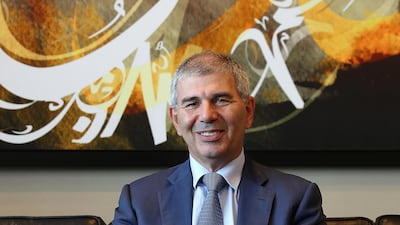Dubai businessman Patrick Chalhoub, who made a personal investment in the now defunct private equity company Abraaj, said its collapse highlighted the need for better corporate governance but cautioned against over-regulation.
The collapse of Abraaj and the subsequent arrests of its top executives came as a surprise, given the company's founder Arif Naqvi was known for supporting philanthropy, mentoring entrepreneurs and sponsoring the arts, Mr Chalhoub said.
"Governance is absolutely key and transparency in what you do and how you do it, this is the lesson that needs to be learnt," Mr Chalhoub told The National. "We have to have responsible businesses and responsible people managing the businesses … We have to stop saying 'regulation, regulation, regulation.' Otherwise we over regulate and you kill entrepreneurship."
Abraaj, which at its peak claimed to manage almost $14 billion in funds, was forced into liquidation last June after a group of investors, including the Bill & Melinda Gates Foundation, the World Bank's International Finance Corporation and the Overseas Private Investment Corporation, a US government development-financing agency, commissioned an audit to investigate the alleged mismanagement of money in its $1bn healthcare fund.
Mr Chalhoub invested in Abraaj’s APEF IV, also known as Abraaj’s Fund 4 or Fund IV. He invested as a private individual using his personal funds and not through his family business, the Middle East luxury retailer Chalhoub Group, which he heads. In January, British private equity company Actis was manoeuvring to take over the $1.6bn buyout fund as part of the liquidation process, however some investors are not supportive.
“This is totally personal funds which is nothing to do with the group,” Mr Chalhoub said, declining to reveal the size of his investment. The amount was “limited” and “immaterial”.
“I still hope I will recover the money I have invested and even more. It’s not a huge sum of money, but I hope I will lose zero pennies into it,” he said. “I’m not overstretched or over stressed about it.”
Fund IV consisted of two parallel Cayman Island entities, one of which was Sharia compliant, according to an April 2017 Abraaj presentation on the company's track record and other documents seen by The National. The fund was set up to invest in greenfield projects, privatisations, growth capital opportunities and buyouts in the Middle East, North Africa, South Asia and the Levant region. AIML, a 100 per cent owned subsidiary of Abraaj Holding, was the investment manager of the fund.
The collapse of Abraaj, which sent shockwaves through the financial community, has not deterred the businessman from the idea of investing in private equity companies or venture capitalists. Mr Chalhoub said he has invested in two other private equity entities, one of which channelled funds into local success story Careem, the Dubai ride-hailing app that was acquired by Uber, and the returns have multiplied.
“It did not put me off,” he said. “It neither increased nor decreased my appetite into things which I find interesting. The best investment would be into my own businesses.”
Last week, US prosecutors brought criminal charges against three more former executives of Abraaj Capital, accusing them of taking part in a massive international scheme to defraud investors.
Its former managing partner Waqar Siddique, former vice president Rafique Lakhani and former chief financial officer Ashish Dave were all charged with fraud and conspiracy, according to an indictment unsealed in Manhattan federal court.
Three other former Abraaj executives, including Mr Naqvi, were charged earlier this year.


